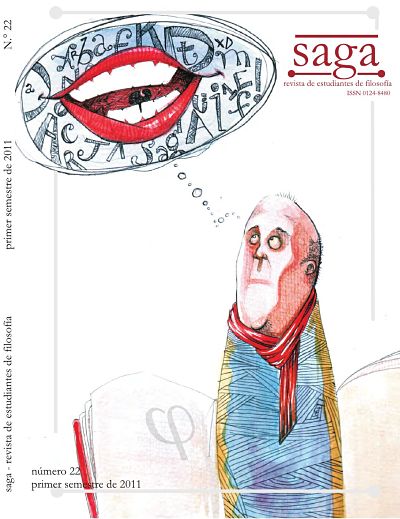El sentido común en Hannah Arendt: La fuente del sentido de realidad
The Common Sense in Hannah Arendt: The Source of the Sense of Reality
Palabras clave:
Conocimiento, Pensamiento, Sentido común, Sentido de realidad (es)Knowledge, Thought, Common sense, Sense of reality (en)
Descargas
The notion of common sense in Hannah Arendt’s work plays a fundamental role at the moment of explaining how a man of the kind of Adolf Eichmann could maintain an authentic disability to think. Nevertheless, the way this authoress understands that notion is not fullly clear: common sense is situated seemingly in an average point between the activity of thought and scientific knowledge, so even if the sense of reality provided by the common sense seems to be fundamental for both, these, given the way in wich they opposed each other, do not diminish to this mere sense of reality. As I believe, the tension that generates this phenomenon can be evaluated with more clarity if the expression ‘common sense’ is studied from two different meanings –though complementary– in agreement with his passive and active character: the common sense can be understood from a ‘sensitive’ point of view and a ‘semantic’ point of view, respectively.
Referencias
Arendt, H. “Comprensión y Política”. De la historia a la acción. Barcelona: Paidós, 1998.
Arendt, H. “El pensar y las reflexiones morales”. De la historia a la acción. Barcelona: Paidós, 1998.
Arendt, H. La Vida del Espíritu. Barcelona: Paidós, 2002.
Arendt, H. Lectures on Kant’s Political Philosophy. Chicago: The University of Chicago Press, 1992.
Arendt, H. Eichmann en Jerusalén.. Trad. Carlos Ribalta. Barcelona: DeBolsillo, 2005.
Álvarez, J. “De la inutilidad y el sentido común”. Ponencia para el seminario Pensamiento y acción. A cargo del profesor Bernardo Correa. 2009-II. (Inédita)
Borges, J.L. Historia Universal de la Infamia. Barcelona: Ediciones Destino Emecé, 2003.
Locke, J. Ensayo sobre el Entendimiento Humano. Trad. Eduardo O’Gorman. México: Fondo de Cultura Económica, 1956.
Cómo citar
APA
ACM
ACS
ABNT
Chicago
Harvard
IEEE
MLA
Turabian
Vancouver
Descargar cita
Visitas a la página del resumen del artículo
Descargas
Licencia
Derechos de autor 2022 Saga – Revista de Estudiantes de Filosofía

Esta obra está bajo una licencia internacional Creative Commons Atribución-NoComercial-SinDerivadas 4.0.
Todos los documentos alojados en esta web están protegidos por la licencia CC attribution non commercial no derivatives 4.0 intenational

















